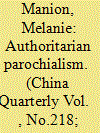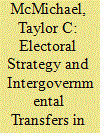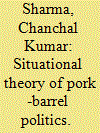| Srl | Item |
| 1 |
ID:
132946


|
|
|
|
|
| Publication |
2014.
|
| Summary/Abstract |
This article draws on evidence from loosely structured interviews and data from original surveys of 5,130 delegates in township, county and municipal congresses to argue that congressional representation unfolds as authoritarian parochialism in China. It makes three new arguments. First, popularly elected local congresses that once only mechanically stood in for the Chinese mass public, through demographically descriptive and politically symbolic representation, now work as substantively representative institutions. Chinese local congressmen and women view themselves and act as "delegates," not Burkean trustees or Leninist party agents. Second, this congressional representation is not commonly expressed in the quintessentially legislative activities familiar in other regime types. Rather, it is an extra-legislative variant of pork-barrel politics: parochial activity by delegates to deliver targeted public goods to the geographic constituency. Third, this authoritarian parochialism is due to institutional arrangements and regime priorities, some common to single-party dictatorships and some distinct to Chinese authoritarianism.
|
|
|
|
|
|
|
|
|
|
|
|
|
|
|
|
| 2 |
ID:
161402


|
|
|
|
|
| Summary/Abstract |
Japanese distributive politics draws scholarly attention as a partial but powerful explanation of the LDP’s electoral dominance via the contention that the LDP rewarded its supporters and punished its opponents. But the empirical evidence disappears when intergovernmental transfers, which can be tracked to electoral constituencies, are examined. Using intergovernmental transfer data, this article tests four separate hypotheses.
|
|
|
|
|
|
|
|
|
|
|
|
|
|
|
|
| 3 |
ID:
152456


|
|
|
|
|
| Summary/Abstract |
Despite the extensive literature on distributive politics, there is still is a lack of a theory of how political and fiscal institutions interact to shape the pork barreling ability of national leaders in a federal parliamentary democracy. This article examines how the party system types (dominant party versus coalition system) and particular attributes of discretionary grants (providing credit claiming opportunity or facilitating side payments) influence opportunities for pork-barrel politics. This article proposes a situational theory of distributive politics that states that incentives for exclusive targeting of affiliated states in one-party dominant systems drive national ruling parties toward particularism while the shrinking opportunity to indulge in such a policy in multiparty coalition systems creates a universalization effect. The disaggregated analysis of discretionary grants using Indian data for 14 states for the one-party dominant period (1972–89) and the coalition era (1996–2012) confirms the theoretical expectations. Additionally, the exercise brings to the fore the fact that the shift from particularism to universalism occurs for schematic grants that provide credit claiming opportunity. The ad hoc grants that are like side payments remain subject to particularism.
|
|
|
|
|
|
|
|
|
|
|
|
|
|
|
|